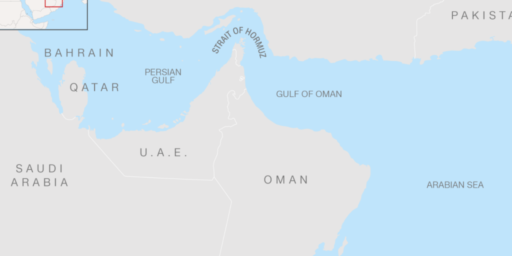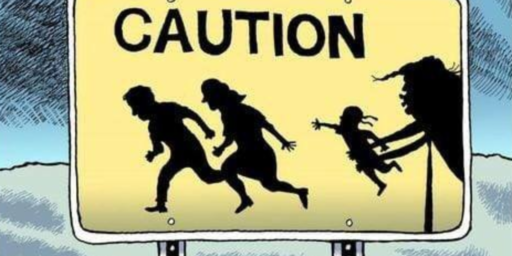Nigerian Guerillas Attack Oil Industry, Kidnap 9 Foreigners
A Nigerian terrorist group kidnapped nine foreigners, including three Americans, in an attack on the country’s oil industry.
Nigerian militants began a string of attacks on the country’s oil industry on Saturday, abducting nine foreign workers, bombing a major tanker loading platform and sabotaging two pipelines.
Royal Dutch Shell suspended exports from the 380,000-barrel-a-day Forcados tanker terminal, and shut down the 115,000-barrel-a-day EA oilfield as a precaution. That cut 21 percent of the 2.4 million barrels of daily supply to world markets by Nigeria, the eighth-largest oil exporter.
The Movement for the Emancipation of the Niger Delta said the attacks were a response to military air raids in Delta State earlier this week and would be followed by another wave of violence “on a grander scale.” “These hostages are human shields,” the militants said, calling on all oil workers to leave the delta. “Subsequent attacks on other installations will be drastic as we have no intentions of taking hostages.” The militants said they wanted more local control over the Niger Delta’s vast oil wealth and the release of two ethnic Ijaw leaders, including a militia leader who is on trial for treason.
In military-style predawn raids, militants in speed boats stormed an offshore barge operated by the American oil services company Willbros and abducted nine workers — three Americans, one Briton, two Thais, two Egyptians and a Filipino.
John Robb has more on this. In a previous post, he predicted this sort of attack as the next logical step for global terrorists. He thinks it an excellent strategy with much more upside for the terrorists than large-scale attacks like 9/11.
The impact of these attacks, particularly if they are numerous (attracting copycats?) and spread out over an extended period of time will be severe. Given their lack of symbolic content (and the potential that they will be relatively anonymous), the moral benefit to US cohesion will be small. Initial outrage against the attackers will quickly turn against the government itself, with severe repercussions (particularly if the government’s response is crude and deemed ineffective). Globally, these attacks will put at risk the US position as a safe haven for investment and may result in a large outflow of capital as the market’s moral sentiment cracks.
I am afraid he’s right. Sabotage attacks like this are quite disruptive and yet unlikely to coalesce the degree of sustained anger that 9/11 did. This is particularly true given that they are more-or-less organic. MEND is not being directed by al Qaeda but they nonetheless providing synergy with each other’s goals.






If it becomes a serious threat, the oil industry will hire the same contractors for security the government does, and pay them even better — they can afford to. I don’t see this as a real threat. Economic terrorism versus the oil industry will have to be on a large and much more destructive scale, such that it cannot be countered by a team of well trained security types or investment in decent defensive hardware — I don’t see the capability right now. Currently these targets are soft and easy pickings. I just don’t see the industry sitting on its hands waiting to be rescued if things get really rough.
Terrorists are lazy, they don’t attack directly where the strength is, they attack at the fringes, where the weakness lies, with the minimal force necessary to cause maximum gain. Boxcutters and light airline security was a brilliant move (cost to them to stage it versus the cost to us reacting to it make the 9/11 attack probably the single most effect attack in history). Thus, I see container ports a much more likely entry point for the next level of terror — the cost to truly secure these has a far greater economic impact than attempting to attack the resource rich oil industry.
What in the world are you talking about, James? This is a pretty old method used by insurgents to advance their political agendas. I am not sure if there are any “lessons to be learned” by this especially given the fact that the current dispute inovlving the Movement for the Emancipation of the Niger Delta emerges entirely out of the history of corruption in Nigeria, the role of oil wealth in sustaining corruption, and long-standing regional independence movements that have been prevlent in the country since its independence from the UK in 1960.
To link this event to John Robb’s previous post is absurd given the fact that this has absolutely nothing to do with the US or its interests. Independence groups in Third World countries bordering on anarchy offer little in the way of understanding how terrorists might operate in the US.
You fall in the trap of assuming that “terrorist” groups are some sort of homogenous whole without recognizing the historical context of these groups’ emergence.
I have pondered why the Saudi wells haven’t been destroyed, and my best guess is that al-Qaeda and its colleagues are still enjoying too much under-the-counter $$$ support from Saudi millionaires.
For many years, the problems of the Middle East and Sub-Saharan Africa have been blamed on America, “The West,” or, for good measure, the Zionists.
I will not enjoy the misery to which these parts of the world seem headed, but I will not miss the arrangements that made blaming everybody BUT the people in these parts of the world appear at least superficially plausible.
Nigerians who wan’t freedom, or at least non-Sharia, need to speak up and act up now, and if they can’t, they will share blame for what comes next.
Also,we might want to seriously consider building about a hundred nuclear power planst some time next week.
One advantage for the terrorist is the left can reuse their “No blood for oil” placards.
The power plants sound like a good idea, but do any of you Libs think could talk one of your mad scientists into cloning us a couple of General Patton’s.
Jonk — what are you talking about that this is an easy set of attacks to defend against? Reading through Robb’s work, and then looking at Iraq, linear, fairly brittle systems with easily identifiable chokepoints and potential failure nodes are damn tough items to defend. Sure security forces can defend hard points such as a refinery, but that refinery is useless if all the pipelines into it are cut [Bajii], or if the truck drivers are too scared to go to work [Bajii] or if international capital and manpower for repairs becomes very reluctant to enter the operational area [all of Iraq] and spending billions of dollars on security does not guarantee positive security outcomes [Iraq]. This problem is especially severe when the critical infrastructure goes through territory of a fairly homogenous group that believes it should be getting a much better deal than it collectively and currently is.
Finally, the point of Robb’s work is to point out that the modern/post-modern global arrangements of states is heavily dependent on thousands of lightly to non-protected systems that are extraordinarily vulnerable to low cost attacks by quasi organized groups acting with a fairly high degree of self-direction and low centralized organization. You are arguing his point for him while trying to argue against it.
You have to make the targets harder to hit, not impossible…the oil industry (here in the US) has the resources to defend the main installations and definitely the offshore rigs. They just don’t want to invest in that defense, and allow the fluctuations in the market to panic the government (i.e. the citizens) into doing it for them. I agree you cannot defend thousands of miles of pipeline, but if the terrorists find it *harder* to do so, you can count on them to move on to something easier.
I am afraid the US (and the West in general) is not in this for the long haul; we are only in it until the next election…this is going to be a generational war.